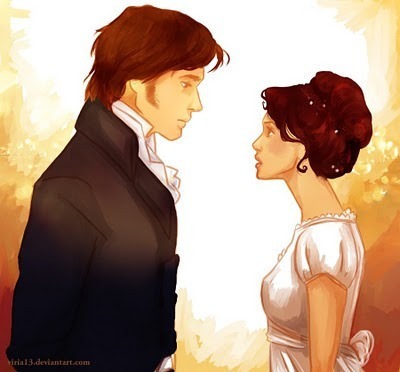First Impressions
 K.M. Weiland on Wordplay recently wrote a post on what constitutes a good opening sentence in a story. Having gone through that grueling exercise in English class of making "hooks," as well as being an author, I know how hard it is to make that first impression really count. I found her post to be very insightful, and I certainly recommend it. But what jumped out at me was the curious realization that once you have got past that killer first sentence in a story, you don't usually remember it. Think about the last good book you read: can you remember the opening line? Well, I'm bad at memorizing anyway, so I like to think I'm exempt. Maybe. But I did wonder: what are the opening sentences of the books I love most? So I thought I would figure out.
K.M. Weiland on Wordplay recently wrote a post on what constitutes a good opening sentence in a story. Having gone through that grueling exercise in English class of making "hooks," as well as being an author, I know how hard it is to make that first impression really count. I found her post to be very insightful, and I certainly recommend it. But what jumped out at me was the curious realization that once you have got past that killer first sentence in a story, you don't usually remember it. Think about the last good book you read: can you remember the opening line? Well, I'm bad at memorizing anyway, so I like to think I'm exempt. Maybe. But I did wonder: what are the opening sentences of the books I love most? So I thought I would figure out.From the Fosse Way westward to Isca Dumnoniorum the road was simply a British trackway, broadened and roughly metalled, strengthened by corduroys of logs in the softest places, but otherwise unchanged from its old estate, as it wound among the hills, thrusting farther and farther into the wilderness.
The Eagle of the Ninth, Rosemary Sutcliff
On a blustery autumn day a galley was nosing up the wide loop of a British river that widened into the harbour of Rutupiae.
The Silver Branch, Rosemary Sutcliff
The thing happened with the appalling swiftness of a hawk swooping out of a quiet sky, on a day in late spring, when Freya was not quite five.
The Shield Ring, Rosemary Sutcliff
Hear me! we've head of Danish heroes, ancient kings, and the glory they cut for themselves, swinging mighty swords!
Beowulf
In a hole in the ground there lived a hobbit.
The Hobbit, J.R.R. Tolkien
(Okay, I can remember this one.)
Once upon a time there was a little dog, and his name was Rover.
Roverandom, J.R.R. Tolkien
My dear Wormwood, I note what you say about guiding your patient's reading and taking care that he sees a good deal of his materialist friend.
The Screwtape Letters, C.S. Lewis
I seemed to be standing in a bus queue by the side of long, mean street.
The Great Divorce, C.S. Lewis
As I left the railway station at Worchester and set out on the three-mile walk to Ransom's cottage, I reflected that no one on that platform could possibly guess the truth about the man I was going to visit.
Perelandra, C.S. Lewis
There was a man named Lessingham dwelt in an old low house in Wastdale, set in a gray old garden where yew-trees flourished that had seen Vikings in Copeland in their seedling time.
The Worm Ouroboros, E.R. Eddison
First, I shall undertake the proof and defence of the great truth that the affairs of the saints in this world are certainly conducted by the wisdom and care of special Providence.
The Mystery of Providence, John Flavel
The first place that I can well remember was a large pleasant meadow with a pond of clear water in it.
Black Beauty, Anna Sewell
The primroses were over.
Watership Down, Richard Adams
It is quite untrue that the Minnipins, or Small Ones, were a lost people, for they knew exactly where they were.
The Gammage Cup, Carol Kendal
In the last days of Narnia, far up to the west beyond Lantern Waste and close beside the great waterfall, there lived an Ape.
The Last Battle, C.S. Lewis
Marley was dead, to begin with.
A Christmas Carol, Charles Dickens
They are all of them (I find) fascinating, inspiring, puzzling. You want to follow the Fosse Way into the Devon wilderness. You want to find out what on earth a hobbit is. What about Lessingham, and what's so important about an ape? And they all, to varying degrees and with varying kinds, contain a sort of magic - either jarring or enchanting or bewildering - that draws me in. And the magic is twofold: maybe I don't recall the opening sentence, but as soon as I read it again, all the enchantment of the story that I read before wells up at me out of that single introductory line. Not to put any pressure on writers, but that line is so dreadfully important. Beginnings are probably the hardest thing I have to write. Not only does the beginning have to lay the correct groundwork for the story (on a basic, pragmatic level) but the beginning has to yank the reader in head over heels and hold him under until he succumbs to the medium of my writing.
That sounds more sinister than I meant it to.
I know I'm not the only one who likes these books, and subsequently these opening sentences, so these authors must have known the trick of it. It's an enormous challenge, but I rather like it, and find myself rising to it - though it may be only the combined effects of my tea and "Moving" by The Secret Garden. I dare say they conjure a somewhat war-like attitude.
How about you? What are the opening sentences of your favourite books that draw you in to dance among the written word?
Do post!
Published on September 19, 2011 07:16
No comments have been added yet.



